Stephen Roney's Blog, page 260
January 23, 2020
The Sixth Commandment
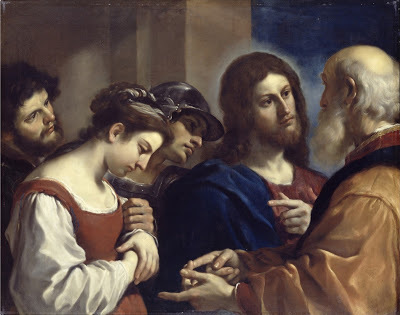 Jesus and the woman taken in adultery.
Jesus and the woman taken in adultery.You shall not commit adultery.
This, at last, is straightforward. You must not have sex with someone if either of you is married, and not to each other.
Although it has been extended in both Christianity and Judaism to refer to any sex outside marriage, strictly, it is this that is prohibited.
And the reason seems plain: violation of trust. Betrayal. Marriage is a promise of sexual exclusiveness.
'Od's Blog: Catholic and Clear Grit comments on the passing parade.
Published on January 23, 2020 15:51
January 22, 2020
William Blake on Speaking Out
Always be ready to speak your mind, and a base man will avoid you.
-- William Blake
One is often advised the opposite: to hold your tongue and always keep your own council. To be judicious in your speech. Be wary of offending.
This was not Blake's way. But it was also not the way of John the Baptist or of Jesus or of the prophets, surely,
'Od's Blog: Catholic and Clear Grit comments on the passing parade.
Published on January 22, 2020 16:36
Charest Out
I’m disappointed that Jean Charest is not going to run for the Conservative leadership.
On the other hand, I can understand why he decided to stay out. There was obviously fierce opposition to his bid. So, even if he did take the post, he would have to deal with a disunited party.
'Od's Blog: Catholic and Clear Grit comments on the passing parade.
Published on January 22, 2020 16:31
Pleading the Fifth
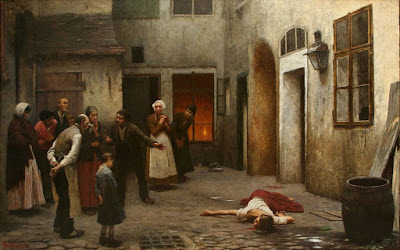 The painter did it.
The painter did it.You shall not kill.
Brief and to the point. What could be simpler? Yet this commandment too has caused much disagreement. Is war prohibited? Is self-defense? What about killing animals, for food?
Many Hebrew scholars argue that the word translated “kill” here—retzach—properly means “murder.” Some Bible translations have the commandment as “You shall not murder.”
But this too is dubious, and troublesome. “Murder” is a legal term: “unlawfully kill.” This leaves the sin to the absolute discretion of the civil authority; which is not a reliable moral guide. Hitler killing Jews in Nazi Germany would be okay.
And the same word is used elsewhere in the Bible when it cannot mean “murder”: for example, it is used to describe actions of God.
Yet “kill” is also not accurate. Retzach cannot mean “kill,” in the English sense, for the Bible itself, and Exodus itself, presents killing in war and capital punishment as not just proper but at times commanded by God.
Perhaps, to get to the sense of the commandment, we need to back up to the fundamental question: why is murder wrong? We all know it is wrong, so that asking the question seems outrageous. But we need to ask: how do we know that killing is wrong?
After all, God kills everyone—sooner or later. He could have made the world differently; he did not.
And for the just, death is a reward. So killing a good person is not harming him or her.
We know that killing is wrong, I submit, because we know that, in the eyes of God, or from any objective view, all human beings are equal in basic worth. Accordingly, no one person has the right to kill another; that would be radically elevating self over other.
So the essential issue addressed by the commandment is a mortal human taking upon him or herself an action reserved to God.
Meaning killing out of self-will, as self-assertion.
Killing in war, or in self-defense, would be licit, given that one is killing under necessity or command. The war itself might be licit or illicit. Capital punishment could be licit, if necessary to preserve public order. But this is a dubious claim in modern times and ordinary circumstances. It might become licit in a time of war, emergency, or insurrection.
Killing of animals for food, or for other purposes, is licit, because animals are not our spiritual equals. Once you extend the commandment beyond fellow humans, you get into trouble. Is it murder, then, to swat a mosquito? To kill a cancer virus?
Obviously, human life often requires us to kill other creatures for our survival.
We should no doubt avoid cruelty to animals, and frivolous killing. Just as we should avoid excessive force in self-defense, or bloodthirsty methods in war.
For my part, speaking for myself, the commandment inspires me to be vegetarian. After all, I can survive quite comfortably in most situations without killing any sentient animals. So is it perhaps an expression of selfishness to do so?
The bulk of the Christian monastic tradition, at least, agrees.
But, outside of Lent and Fridays, the same obligation has never been considered general. It is good to be vegetarian, It is not necessary to be vegetarian to be good.
'Od's Blog: Catholic and Clear Grit comments on the passing parade.
Published on January 22, 2020 08:33
January 21, 2020
The Fourth Commandment
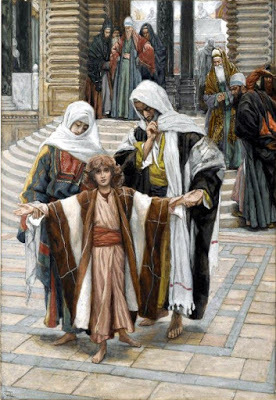 Finding Jesus in the temple: Tissot
Finding Jesus in the temple: Tissot“Honor your father and your mother, so that you may live long in the land the Lord your God is giving you.”This is often cited as a requirement to obey your parents. This is probably the context in which most of us know it best, because we probably heard it presented this way repeatedly as children—and quite possible not since.
But this cannot be the core meaning.
It makes sense to advise children to obey their parents; their parents, being adults, will usually know best. But the Commandments are not for children. Below the age of reason, seven according to traditional thought, children cannot sin. Above the age of twelve, they are apparently under no obligation to obey their parents. Because Jesus clearly did not in the Gospels.
That is, he did not depart Jerusalem with his parents, but remained in the Temple, declaring it his true father’s house—implicitly denying his biological parents had any authority over him.
At the Wedding at Cana, when Mary asks him to help by performing a miracle, his immediate response is “What have I to do with you, woman?”
Below the age of twelve, was little Jesus obedient to his parents? There is nothing in the gospels. The one source we have is the Infancy Narratives of Thomas, from the First or Second Century. In it, Jesus is notably disobedient and disrespectful, to parents and teachers, and his relationship with his mortal father Joseph is tense. The Thomas Infancy Narratives were never accepted as authentic by the Church. But some of its incidents are repeated in the Quran. Obviously, some significant group of people took them seriously, for them to be preserved until today and spread beyond the Roman world in the days when all manuscripts were hand-copied.
So obedience to parents or deferring to their authority, is not the meaning of this commandment.
Which ought to be self-evident in any case. The average parent is, necessarily, no better a moral guide than the average person. Greater experience may give them an advantage over someone younger, especially in the case of a young child. But we know this is not conclusive. Otherwise, we would not bother with elections; we would just make the oldest among us king. It is entirely probable that, in any given case, an adult child will be a better judge, or more moral, than their parent.
And after all, deferring to another for moral judgements is an abdication of conscience; we are moral agents because we choose between right and wrong. It is what raises us above the animals.
From this perspective, an adult child automatically submitting to their parent’s will is being immoral.
To defer to another adult is also a violation of the concept of human equality. The consistent teaching of the Gospel is that we are all brothers, and all children of God. To defer to some fellow mortal instead of to our true father becomes an idolatry. Jesus even said, “Call no one father but your father who is in heaven.” “He who does not despise his father and his mother for my sake is not worthy of me.”
The Catholic Church extrapolates from this commandment an obligation to respect civil authority. This seems right. Even though the law is often wrong, even though the government is often corrupt, it is important to obey it in most ordinary circumstances to preserve public order. The same surely applies within the family, as a social institution—so long as it is operating as such. If everyone just does as they want, no social institution can function; the result is chaos. So clear lines of authority must be established.
But then, just as there can be just wars, despite the commandment not to kill, there can be just revolutions. Governments can be oppressive.
In such a case, resistance become a duty. So Augustine, long before the American Declaration of Independence; so Aquinas. Von Stauffenberg led the plot to assassinate Hitler as a devout Catholic. St. Thomas More was executed for treason. Jesus was executed by the civil authority—on the charge, even if false, of insurrection.
So too with a bad parent. Suppose, as with Huckleberry Finn, your father is a hopeless alcoholic. Is it your moral duty to go out and find him more gin?
Jewish sources understand the word we translate as “honour” to mean something like “repay a debt.” And it is a Hebrew word. That is, given that your parents supported you in childhood, you are morally obliged to support them in their age. This explains why the commandment is followed by a promise or a justification: “so that you may live long.” If we make a point of taking care of the aged, we all get to live longer. The alternative, in uncivilized societies, if often to leave the aged on the ice to starve, once they become a burden.
'Od's Blog: Catholic and Clear Grit comments on the passing parade.
Published on January 21, 2020 07:29
January 20, 2020
Classism in Canada
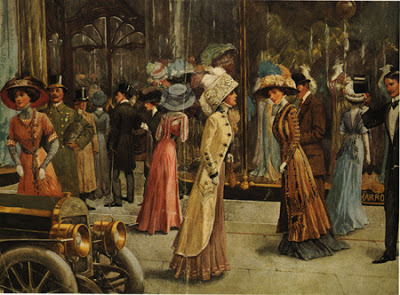 Members of the English upper classes throng around Harrod's, early 20th century.
Members of the English upper classes throng around Harrod's, early 20th century.Canada has never had a formal ruling class. Actually, “never” is not right. New France had a ruling class under the seigneurial system. But since the British Conquest, it hasn’t. Everyone was a freeholder.
We North Americans tend not to realize how unique this is. It is foundational. Everywhere in the Old World, class something you were born into, it was unambiguous, and it was enforced by law.
Although that system has been abolished, profound effect linger. At my college in Saudi Arabia, I was the sole North American for some years, and hung out with Brits and Irish. They would dismiss someone, for example, as a “peasant”; as though that were saying something to the latter’s discredit. You don’t hear “peasant” as a common insult in Canada. Or they would refer to tradesmen disparagingly as “cowboys.” As if there were something wrong with being a tradesman or a cowboy.
Same in China. My students were acutely aware of one another’s background. One doctoral student, his fellows warned me, was “just a peasant.” Not to be taken seriously.
While there, as is traditional, I took a Chinese name. I chose “Shi Jiang.” Literally, “Stone River”; the image appealed to me. It meant roughly what the name of my home town, Gananoque, means in Iroquoian.
My students were most concerned. They felt it undignified for a college professor. “You shouldn’t take that name! That’s a working class name!”
Because “Shi Jiang” is also the Chinese term for a stonecutter or stonemason.
Compare Canada: Alexander Mackenzie, our second Prime Minister after Confederation, was a stonemason.
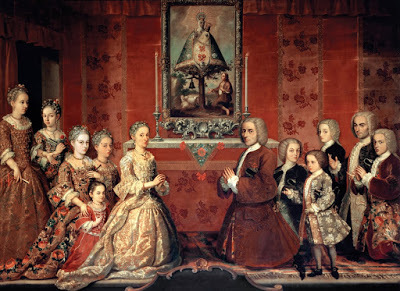 Even other parts of the Americans had established upper classes. Here, Mexican aristocrats.
Even other parts of the Americans had established upper classes. Here, Mexican aristocrats.And don’t get started on India and the remaining influence of the caste system.
We in Canada lack this influence, like the US and Australia. This is what it means when the Declaration of Independence declares that all men are created equal, and are entitled to equal protection from the law.
We no longer understand how revolutionary that was. Revolutionary to none so much as my Irish ancestors, Catholic and Protestant, who formed the bulk of the population of English Canada in the 19th century. It instilled in them a fierce loyalty to this land, which immediately could not be swayed by any American or Fenian invasion, or any tragic events back in Ireland. Here, everyone pulled together.
But perhaps all this is changing.
Because we have never known class, perhaps we no longer understand the danger.
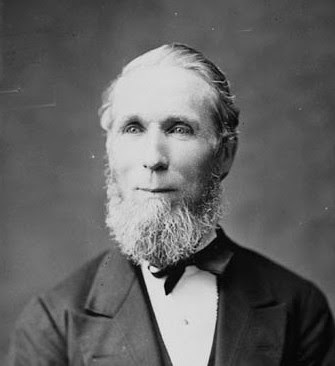 Alexander Mackenzie.
Alexander Mackenzie.We are admitting immigration now at unprecedented levels. These newcomers are liable, indeed likely, to retain their notions of class, and bring them with them. In smaller numbers, they might soon see differently; this is less likely when the numbers are so large.
Worse, for decades, our Canadian immigration system has been favouring the well educated and well heeled, on the premise that these will most likely soon be net contributors, instead of net drags, on the economy and the tax rolls. A reasonable assumption—but since we are drawing newcomers largely from the Third Word, this means we are importing the resident ruling classes.
They, of anyone, will be disinclined to shed their classist attitudes.
Has anyone else considered the probable result?
All this is amplified by another factor: ironically enough, our democratic system.
Some years ago, I got involved in local politics. I learned from a local alderman that the only way to achieve office was to have some organized group behind you. More than money, you needed volunteers, to knock on doors, put up posters, and get out to vote for you because you were one of them.
This means that, despite the theories, local democracies can be controlled by small groups—cliques.
In Canada, because of the Westminster system, all politics is to some degree local—office is achieved riding by riding. Such tight-knit, organized groups can easily take over nomination meetings, then significantly advantage their chosen candidate in the election.
This explains why identity politics is so powerful: organized minorities with strong self-identities thus magnify their power far beyond their numbers.
And, in effect, they can become a de facto ruling class; even a legally enforced ruling class.
We see this power being exercised by the teachers’ unions; by CUPE; by the feminist lobby, the gay lobby, and the professions. The farmers, the farm lobby. Regardless of what the majority of the population wants, or what is in their interests, the various parties tend to bow to their agendas and interests.
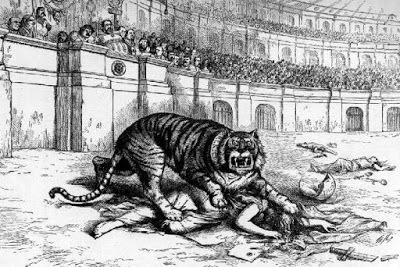 Tammany Hall devouring democracy--19th century cartoon by Thomas Nast.
Tammany Hall devouring democracy--19th century cartoon by Thomas Nast.And the same principle works well for tribal groups of immigrants, who will come out for one of their own. The alderman who explained the system to me back in Kingston was Greek; his machine was the Greek community. In the old days in Toronto, it was always the Orange Lodge. In the big city machines in the US, it tended to be the Irish Catholics. When I ran for school board in Toronto once, I found myself caught in the crossfire between the Italian candidate and the Portuguese candidate.
All this is bad enough. But our new ethnic tribes are not just close-knit, enabling them to take power; they are also largely composed of people who view themselves as upper class, with upper class attitudes and with upper class expectations or privilege and advantage.
And official multiculturalism is actually encouraging and underwriting this process. In fact, the sacred cow status of multiculturalism is perhaps itself an example of a ruling class carving out for itself special and separate privileges.
Besides killing off multiculturalism, and changing our immigration system, we should introduce some counterbalance to local control of all offices. Such as an elected senate, elected proportionally from national lists.
'Od's Blog: Catholic and Clear Grit comments on the passing parade.
Published on January 20, 2020 15:16
Jerusalem Today
David Olney, the man who wrote this song, died peacefully on stage yesterday of a heart attack.
'Od's Blog: Catholic and Clear Grit comments on the passing parade.
Published on January 20, 2020 14:09
January 19, 2020
The Week in Pictures
Always a few laughs out loud here.
'Od's Blog: Catholic and Clear Grit comments on the passing parade.
Published on January 19, 2020 10:04
King's University College Faculty Protest Anti-Abortion Film
Published on January 19, 2020 09:59
I've Seen the Future, Brother. It is Murder
 The Spirit of the Age?
The Spirit of the Age?A troubling thing; a poetic friend has sent me a really fine poem he wrote. But it is a fantasy about raping some woman. Perhaps also killing her.
Recently George Elliott Clarke was forced to pull out of a Regina reading because he had planned to read poetry by Stephen Brown. Clarke has edited some of his work, and obviously considers him a good poet. Brown was convicted of murdering a local girl.
What is going on here?
It is hard enough that we cannot trust government, or the clergy. Now it seems we cannot trust poets either.
Even though they, to the extent that they are good poets, have a direct line to the spiritual world—“inspiration.”
Leonard Cohen seems to have seen this coming. In “The Future,” he refers to
“All the lousy little poets coming round,
Trying to sound like Charlie Manson.”
It is all a reminder, in the first place, that, if poets channel spirits, not all spirits are good spirits. There are demonic forces.
Sensitive souls are connecting, it seems, to some deep rage. And it seems to be a rage against women. Perhaps aroused by feminism, perhaps by the “sexual revolution.”
Cohen also may have seen that. The lines just before those quoted above are:
“You’ll see your woman hanging upside down
Her features hidden by her fallen gown.”
We are in a post-Christian phase, as a culture, and perhaps the pagan rules again apply.
Perhaps we are hearing from the Erinyes.
'Od's Blog: Catholic and Clear Grit comments on the passing parade.
Published on January 19, 2020 06:00



